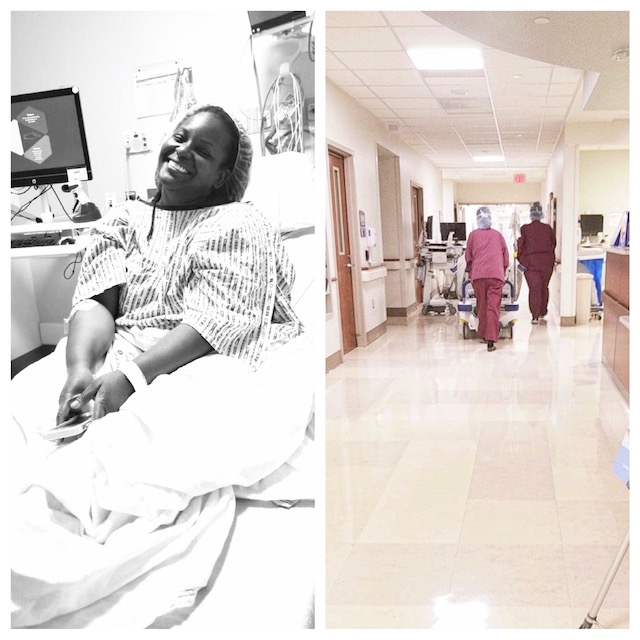Hey Beautiful Fam! So here we are almost to the end of my story—The final surgery. However, as you can imagine, there were some challenges getting to this point. For starters, after the whole IUD fiasco, I decided I wasn’t going to try anymore birth control because of my past experiences. Therefore, from mid-2017 leading up to my surgery earlier this year in February 2020, I managed as much as I could, but I felt like I was always dragging. Most days I would have to take short naps throughout the day because I was so weak. It felt like my body was breaking down and I was never fully rested even if I went to bed early.
One day I went to urgent care due to another medical issue and the doctor completed routine blood work. Once my results came back the doctor stated that she was very concerned because my hemoglobin was “dangerously low.” She immediately gave me a referral to see the hematologist and told me to make an appointment within the next day if possible. The doctor said if my hemoglobin dropped any lower, I would have to have a blood transfusion. I was in shock! But, it did explain why I was experiencing so much fatigue and weakness.
We discussed my health history and my menstrual cycles became the focal point of my doctor visit. The doctor stated that I may have to get iron infusions to bring my hemoglobin up quickly. I asked her if there was an alternative and told her I was prescribed iron pills to help with my anemia. She said with my hemoglobin being as low as it is, the iron pills wouldn’t absorb quickly enough. The doctor said that I was losing too much blood each month, and this was medically necessary to start the iron infusions right away. I remember the doctor being extremely stern with me and letting me know how serious my situation was.
I met with the hematologist and started getting iron infusions as recommended right away. The doctor told me that I need to get a series of 8 iron infusions over the next couple of weeks. I started off by doing the treatments 2 times per week—which is the maximum you can get in one week. After the 5th or 6th treatment I noticed my energy level started to increase. Once the 8 treatments were completed, that is when I realized how much I was struggling. Unfortunately, I would have to do the iron infusions 3-4 times a year because I was still bleeding so much. My hematologist also stated because I have Alpha Thalassemia that makes my situation more complicated. I have a follow up with my hematologist later this month so I will discuss more of what this entails in a later post.
In 2019, I went for my annual checkup with my GYN doctor and found out the fibroid had grown even bigger. She said my uterus was expanding and was the size of a woman who is 4 months pregnant. She stated that I would have to have a myomectomy because of the location of the fibroid. I remember my doctor and I started talking in depth about the surgery and what it would entail. She processed with me that I would not be able to have a vaginal birth in the future and that all my children would have to be delivered via c-section. Now, I know some people may say, “girl you ain’t missing nothing” or discuss the pain of childbirth, however, you have to realize that having a c-section is major surgery and it takes a while for your body to heal on the inside. The doctors are cutting through layers of your skin, have to repair everything back in place and that has its own set of complications. Not to mention grieving the idea of how I always imagined having a baby.
My doctor also recommended I get a second opinion if that would help me feel more comfortable, which I recommend for all women to do. As for my second opinion, the results were the same–surgery. I remember crying for days after that, and my anxiety was on 100. I literally felt sensitive to anything surrounding that topic, but I kept praying God would get me through this process safely. I finally scheduled the surgery that I was dreading and there was no turning back. My health was getting worse and all I could think about was doing what I could to protect my womb.
Prior to surgery, I had to go to several doctors’ appointments and get medical clearance for my operation. Due to my blood disorder they had to find out what my type was in case I needed a blood transfusion during surgery. With the type of surgery I had to have, it’s very common for women to lose a lot of blood especially with the size of the fibroid. I also had to get some iron infusions prior to my procedure because my hemoglobin was low again.
In February 2020, I had an open Laparotomy Myomectomy via cesarean section. The surgeon had to cut through the top of my uterus and break the fibroid into small pieces because it was so big. Fortunately, they were able to get everything out and repaired the top of my uterus. This strategic method allowed my surgeon to perform the operation with a smaller incision. I did lose a lot of blood during surgery but I’m so grateful I did not have to have a blood transfusion. I was in the hospital for 3 days—which I had to fight for, but I’ll talk about that later.
After surgery, there are certain milestones that you must meet before you are discharged from the hospital so don’t let them tell you otherwise. I may have to discuss hospital advocacy at some point because that was also a stressor for me. Just remember, if something feels off, speak up and let them explain what’s going on until you feel comfortable. Every woman’s experience may be different but for me, I had to be able to walk, use the bathroom (a catheter is inserted during surgery) and pass gas. The reason for the emphasis on passing gas is because during the surgery they have to pump gas in your body to expand the uterus so they can have a clear view of where they are operating.
While you are in the hospital there will be several different nurses that visit you to discuss different care plans and discharge planning with you. The surgeon should come and visit you withing 24 hours of the surgery to check your incision and make sure there are no openings or signs of infection. The medical staff also checks your vitals every 3-4 hours. After surgery, be sure to always buzz for the nurse to help you to the bathroom because the anesthesia is still in your system, you’ll be very weak and don’t want to risk falling. This was such a humbling experience for me because I had to rely on the nurses for everything including cleaning me up in the bathroom. Sometimes we take the little things for granted such as being able to wipe yourself or showering on your own.
I’m so blessed this chapter is over and my menstrual cycles are the best they have ever been!



